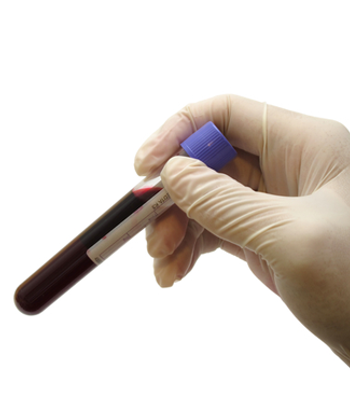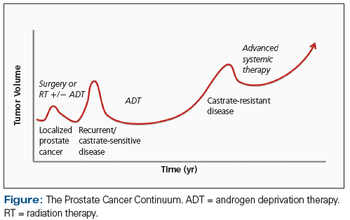
In this review, we describe the historical data for chemotherapy in the perioperative and metastatic prostate cancer settings, and the recent trials that are changing the paradigm in support of docetaxel in the upfront setting.

Your AI-Trained Oncology Knowledge Connection!


In this review, we describe the historical data for chemotherapy in the perioperative and metastatic prostate cancer settings, and the recent trials that are changing the paradigm in support of docetaxel in the upfront setting.

Although great therapeutic advances have been made in metastatic castration-resistant prostate cancer, the role of systemic approaches in the management of patients outside of metastatic castration-resistant prostate cancer remains largely undefined.

Men with prostate cancer who carry variants in the SLCO2B1 gene have shorter time to progression and overall survival.

Men diagnosed with prostate cancer who opt for active surveillance/watchful waiting rather than active treatment may not be receiving quality monitoring of their disease.

Following the USPSTF recommendation in 2012 against routine PSA screening, rates of screening and the incidence of early-stage prostate cancer have both declined.

Researchers have developed a blood test that can identify mutations in the androgen receptor gene that drive resistance to abiraterone. The test could identify prostate cancer patients who will not respond to the treatment.

For men with prostate cancer undergoing radiation therapy, consumption of men’s health supplements are unlikely to prevent adverse events, metastasis, or cancer-related death.

Hypofractionated radiation therapy appears to lead to similar efficacy and safety as a standard radiation therapy regimen for men with low-risk prostate cancer.

The use of bone-seeking radionuclides effectively controlled bone pain in men with prostate cancer metastatic to the bone, according to the results of a systematic review.

A new meta-analysis suggests that survival outcomes are similar with intermittent and continuous androgen deprivation therapy, and that intermittent therapy may improve some quality-of-life criteria.

Six months of radiation therapy combined with ADT for prostate cancer may not produce a survival benefit in men with moderate to severe comorbidities.

There is ample evidence suggesting that physical activity and exercise can be therapeutic tools for patients with prostate cancer. Patients diagnosed with localized disease should be advised to stay physically active; furthermore, patients who are undergoing radiation therapy and/or treatment with ADT appear to benefit from regular aerobic and resistance exercise to alleviate side effects.

Men with low-risk prostate cancer monitored by active surveillance are not likely to have their disease spread to other organs or die of their prostate cancer.

Despite the clearly established overall health benefits of exercise, its role in reducing prostate cancer risk is unclear. Whereas some studies found often dramatic reductions in prostate cancer risk, others found no effect.

Perineural invasion was a significant predictor of increased risk for bone metastases in men with prostate cancer who had suspicion for bone metastases after a whole-body bone scan.

Adding chemotherapy to hormonal therapy in men with metastatic hormone-sensitive prostate cancer increased improved overall survival by 13.6 months.

Researchers have identified a subset of six biomarkers that together may predict the risk of more aggressive prostate cancer among African American men.

This article will describe the historic background of Ra-223; outline the clinical studies which led to phase III trials of this agent; highlight key results of these phase III studies; and explore possible future directions for use of Ra-223 and other alpha particles-both in prostate cancer and for management of other diseases.

Elucidation of the underlying mechanisms of action for Ra-223 will soon expand its clinical utility with respect to improved patient selection and integrated bone-targeted therapies.

The 2015 ASCO Annual Meeting delivered new practice-changing results in the area of prostate cancer.

In this interview we discuss recent trials that looked at the use of upfront chemotherapy combined with androgen deprivation therapy in men with metastatic prostate cancer and how they have changed clinical practice.

In this interview, Dr. Mario Eisenberger talks about potential new combination therapies for advanced prostate cancer that are currently being tested in clinical trials.

The management of patients with localized prostate cancer has improved to meet clinical guidelines, according to a new study.

For the first time, researchers say they have been able to use a prostate fusion biopsy to determine which tumors are the most aggressive.

PSA-based screening for prostate cancer among men older than 50 has decreased since the 2012 USPSTF recommendations.